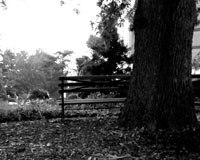
Men Working Above: demolition
Parable of Baiting
Even after the day is done,
their voices undulate. Sweltering subtraction: the day’s agenda.
What is not worth making
new, the thinking goes.
Nothing is inevitably arrived at. The jackhammer
is no thought, all action.
The brights of those sentenced
to the fulfillment of another’s thought. The key to pass through
abstraction into the tangible
is dailiness. Is chiseling.
Only in select conditions are we conditioned to praise
when all is wiped away.
The contract mentions
Select Conditions. The catered lunch given up for lunchboxes
stuffed with PB&Js, the espresso machine
for the water cooler sleeved
with paper cups, the ergonomics of the office chair for power tools
specializing in discomfort,
destruction. Despite the lilt
of their days, they mount these machines, and their voices
morph into the dragonflies
beating against fluorescence,
dumbly hoping to knock loose debris or dust of promise—no,
the sound of the future
floorplan dreamt up and printed
on the latest drafting program now stuck to the face of the box fan
propped in the windowpane.
Time passed
fishing-trip-slow
and, somewhere during,
you decided this would be
the last time
I would come along.
I passed my casting away
from where you suggested
as Saving the fish for you,
but I steered clear for fear
that my beginner’s luck
might pluck a throat
from the throng
threading the belly
of our flat-bottomed boat.
If I was scared
of some damned trout
I could stop from flopping
with my foot or palm,
what else? Baiting—
baiting even minnows
half the size of the trout
that would eat them.
It was not that they are hard
to hold and slippery—
more that tethering them
to a hook meant feeling
what seemed like plastic
in their throats.
But because I cared more
about showing
I did not care
about hurt, I baited minnow
after minnow, punctured
with a click the plastic
inside them to the point
of praying for a better way.
I started closing my hand
into a fist around them
tight as a baitcasting reel,
and they gave to my grip.
When you first realized
I was baiting dead ones,
you told me to throw
them over. When the next
minnow was just as still,
you watched me closer.
Hushed, as to not scatter
the life left underneath
the boat, you told me
to be gentler. What else
did I expect?
Originally from New Iberia, Louisiana, Nicholas Molbert now lives and writes in Southern Ohio. You can find his work at The Adroit Journal, The Cincinnati Review, DIAGRAM, Missouri Review, Ninth Letter, Pleiades, and Permafrost among others.

